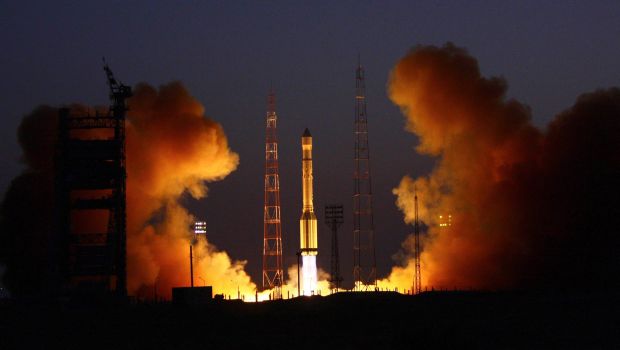
A Proton-M rocket carrying three Russian Glonass-M navigation satellites, blasts off from the Kazakhstan’s Baikonur cosmodrome on September 2, 2010. (AFP PHOTO/STR)
The consul-general said the satellites would be used in the communication and information technology fields. He also noted that Russia has extensive technical expertise that enables it to offer services to Saudi Arabia in the fields of solar and nuclear energy, providing an opportunity to develop the century-old relationship between the two countries.
Dr. Mohammed Ibrahim Al-Suwaiyel, the president of the King Abdulaziz City for Science and Technology (KACST), told Asharq Al-Awsat: “These satellites are categorized as remote sensing satellites, which are used to monitor the earth from low orbits for various development purposes.”
He added that the two satellites to be launched this year are from an advanced generation and that they will carry sensitive equipment capable of taking very accurate photographs, and that the first satellite is dedicated to scientific experiments in cooperation with a number of international scientific parties.
Dr. Al-Suwaiyel added that the aim was to increase domestic capability in the field of design and development of remote sensing satellites. He said the project also aimed to achieve self-sufficiency and to cooperate with international parties in this field, as well as to strengthen cooperation relations between KACST and research centers in universities, institutes and technical colleges in the country. He also expressed KACST’s hopes the project will provide opportunities for higher education students and their supervisors.
The KACST president said Saudi development plans would be realized by benefiting from new scientific discoveries and research in the aeronautics and space sectors at the national, regional and international levels. He added that the Saudi strategic plan in the field of space science, which started its first phase in 2005 and continues to 2025, aimed to achieve international standards in the space research technology field.
With respect to the launch, Dr. Al-Suwaiyel said the date had been fixed according to specific schedules and reservations controlled by parties who have the capability to launch ballistic missiles for peaceful purposes, and that all preparations have been made to launch the first satellite, named Saudi Sat-4, in the final quarter of 2013.
He added that the Russian Kosmotras Company, in cooperation with the Ukranian Ugnina Company, would be in charge of the launch, using a Dunbar rocket from the Yuzhny Space Center in southern Russia. He said the launch would take place under contracts with a number of parties, including KACST, which reduces the cost for all parties involved.
The cost of the launch of each satellite is calculated according to its weight, and the Kingdom will receive a discount due to its cooperation since the first launch in 2000 and KACST’s preparations for the launch, which reduces the work needed by the company that will actually deliver the satellite into orbit.

Trackbacks/Pingbacks